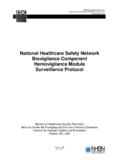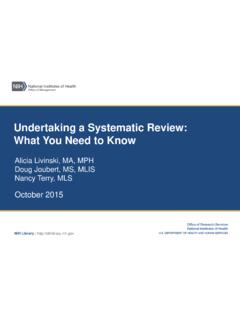Transcription of Dementia - A state of the nation report on dementia care ...
1 DementiaA state of the nation report on Dementia care and support in EnglandNovember 2013 You may re-use the text of this document (not including logos) free of charge in any format or medium, under the terms of the Open Government Licence. To view this licence, visit Crown copyright Published to , in PDF format only. from the Secretary of state for Health 2 The scale of the challenge 4 Prevention 12 Diagnosis 14 Living with Dementia 22 Dementia education and training 41 Dementia friendly communities 45 Research 57 The future 652 Dementia a state of the nation report on Dementia care and support in EnglandForewordWe are facing one of the biggest health challenges ever, a challenge as big as the fights against cancer, heart disease and HIV.
2 Dementia steals lives. It also imposes a huge emotional and financial cost. It is time to fight 670,000 people in England have Dementia and this number is set to double in the next 30 Dementia costs 19 billion a year, and this is going to increase massively. The cost in heartbreak is an estimated twenty-one million people in our country have a close friend or family member with Dementia . Directly or indirectly, it will soon affect every one of us. As a nation , we need to wake up to what is fast becoming one of the greatest pressures on families, carers, and health and care systems. In March 2012, the Prime Minister launched his Dementia Challenge a national programme of action to deliver sustained improvements in health and care , create Dementia friendly communities, and boost Dementia Dementia report , with its accompanying map of variation, available at , shines a light on the quality of Dementia care in England.
3 The very best services are excellent and show what is possible. But the worst show that we still have some way to go. The message is clear: we can and must do better. There has been some major progress. We are better at identifying and assessing people with Dementia in hospitals and have responsibly reduced the prescription of antipsychotic it is unacceptable that less than half of people with Dementia receive a diagnosis and that there is such variation across the country in how long people wait before being seen by a memory service. The availability of post-diagnosis support varies far too much as percent of people with Dementia do not feel part of their community. They often experience anxiety and depression and three quarters do not feel society is geared up to deal with 62 percent of people with Dementia living alone are lonely and it can sometimes be hard to access services, which only adds to this am determined we make our fight against Dementia global, so I am delighted the UK is hosting the first G8 Dementia summit in December.
4 The summit will be unprecedented in bringing together G8 governments, the World Health Organisation (WHO) and the Organisation for Economic Co-operation and Development (OECD), along with pharmaceutical companies, philanthropists, academics, research funders and industry. 1 Prime Minister s challenge on dementia2 National Dementia and antipsychotic prescribing Audit, 20123 Dementia 2012: A national challenge, Alzheimer s Society, 20124 Dementia 2013: The hidden voice of loneliness, Alzheimer s Society, 2013 Foreword 3 It will give us a tremendous chance to make real progress much faster. The planned follow-up events next year mean there is a great opportunity to forge a major lasting we continue to pursue a cure, it is vital we look at how we can help people manage Dementia better, support them to lead healthier lives, and deliver real improvements in have a moral responsibility to fight Dementia and together we will.
5 4 Dementia a state of the nation report on Dementia care and support in EnglandOur vision We want a society where people with Dementia and their carers receive high quality, compassionate care , whether at home, in hospital or in a care home. We want the person with Dementia with their family and carer to be at the heart of everything we do. We want their wellbeing and quality of life to be first and foremost in the minds of those commissioning and providing want people to feel confident that we are making real progress towards preventing and treating Dementia , and that we are relentless in our search for a cure. The health and care system has a vital role to play in improving support for people with Dementia . But it can t do it alone. This is a call to the whole of society. We want to create communities where people are more aware of Dementia , understand it and know how to help. We want communities where people with Dementia and their carers are encouraged to seek help and support and feel able to go about their daily lives safely and free of want a society where people with Dementia can honestly say: I was diagnosed in a timely way.
6 I know what I can do to help myself and who else can help me. Those around me and looking after me are well supported. I get the treatment and support, best for my Dementia , and for my life. I feel included as part of society. I understand so I am able to make decisions. I am treated with dignity and respect. I am confident my end of life wishes will be respected. I can expect a good death. I know how to participate in is Dementia ? Dementia is a syndrome that can be caused by a number of progressive disorders. It can affect memory, thinking, behaviour and the ability to perform everyday activities. Alzheimer s disease is the most common type of Dementia . Other types include vascular Dementia , Dementia with Lewy bodies and frontotemporal mainly affects older people, although there is a growing awareness of cases starting before the age of 65. After 65, the likelihood of developing Dementia roughly doubles every five LSE, King s College London, Alzheimer s Society.
7 Dementia UK: The Full report , 2007 The scale of the challengeThe scale of the challenge 5 Dementia is progressive, which means the symptoms will gradually get worse and the condition is currently incurable. However, medicines and other interventions can lessen symptoms and people may live with their Dementia for a further 7-12 years after diagnosis. I don t let Dementia over take me, it will do one day but for now I enjoy my life. 6 Contrary to common perceptions, there is a great deal that can be done to help people with Dementia . For example, if diagnosed in a timely way, people with Dementia and their carers can receive the treatment, care and support (social and psychological, as well as pharmacological) enabling them to live well with the condition. It is often about the simple things, things that most of us take for granted, like making a cup of tea, that without support someone with Dementia can find practically impossible.
8 Around 60 percent of people with Dementia have Alzheimer s disease, around 20 percent have vascular Dementia and many people have a mixture of the two. There are other less commons forms of Vascular Dementia results from problems with the blood supply to the brain without enough blood, brain cells can die. The effects of vascular Dementia can be minimised or prevented altogether through a healthy lifestyle. Smoking and obesity, for example, affect many types of Dementia , in particular vascular Why is Dementia important?A global challengeDementia is a growing, global challenge. It is one of the most important health and care issues the world faces as the population ages. Globally there is a new case of Dementia every four seconds, and by 2020 we will see nearly 70 million people living with the condition. 9 The worldwide cost of Dementia care is around $600 billion. If Dementia care were a country, it would be the world s 18th largest economy, ranking between Turkey and Indonesia.
9 If it were a company, it would be the biggest in the world by annual revenue, exceeding Wal-Mart (US$414 billion) and Exxon Mobil (US$311 billion). An estimated 28 million people with Dementia worldwide haven t received a formal Brainwaves newsletter october 2013, Innovations in Dementia7 Dementia resources, NHS Health Check8 The Lancet Vol 377 March 19, 20119 UK to host G8 Dementia summit, news story10 Alzheimer s Disease International ( 2011 ), World Alzheimer s report 2011 , ADI, London6 Dementia a state of the nation report on Dementia care and support in EnglandDementia in England There are approximately 670,000 people in England living with Dementia . This number will double in the next 30 years. Dementia in England costs 19 billion a year and there are an estimated 550,000 carers of people with impact of Dementia Dementia has a huge impact on people living with the condition, their families, carers and society more generally.
10 The statistics are compelling:Mortality Of the top 25 causes of years of life lost in the UK due to premature mortality between 1990 to 2010, a study12 found Alzheimer s disease and other dementias had risen from 24th place to 10th, accounting for percent of total years of life lost across the top 25 Currently less than half of people with Dementia in England (48 percent) have a formal diagnosis or have contact with specialist services. The diagnosis rate varies from 39 percent in the worst performing areas to 75 percent in the best. This variation is unwarranted and needs to be care An estimated 25 percent of hospital beds are occupied by people with People with Dementia also stay in hospital for longer, are more likely to be re-admitted and more likely to die than patients admitted for the same care homes and care at home An estimated one third of people with Dementia live in residential care with two thirds living at home.













![DATE: March 27, 2020 TO: FROM: CMS Emergency web page]](/cache/preview/f/0/a/4/2/e/e/6/thumb-f0a42ee69559d644df801d0ca3c8c2e2.jpg)

